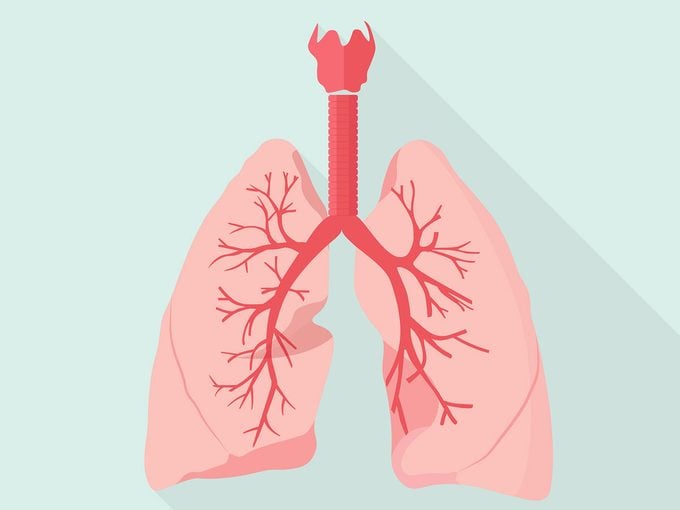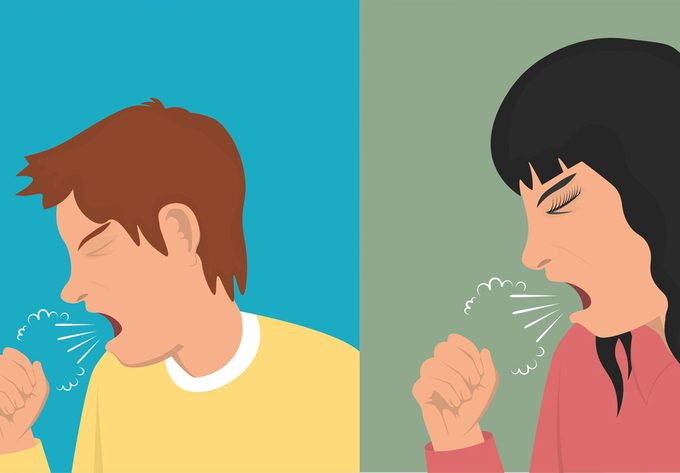Treat Your Bronchitis With Home Remedies That Work
Anyone who's suffered from bronchitis knows what a pain it can be. But if you treat yourself right with these simple home remedies, you can help clear your bronchitis in no time.

Home remedies for bronchitis are actually your best bet when it comes to treatment. Research trials have shown that antibiotics are not effective for the treatment of bronchitis. Despite evidence of ineffectiveness and clear guidelines in the medical world, the prescribing rate for acute bronchitis has actually risen. Research suggests you may not want to bother with cough medicine either.
“Avoidance of antibiotic overuse for acute bronchitis should be a cornerstone of quality health care,” wrote the authors of a 2014 study published in The JAMA Network Journals. Here’s how to get rid of bronchitis, with help from a few natural remedies.
Your goal when you have bronchitis? Thin the phlegm in your chest and get it moving, so you can cough it up and out. The most direct approach to your lungs is the air you breathe, so inhalation treatments are a first resort. Think of them as a steam cleaning for your airways. The right food and drink can also help to keep mucus on the move. Let your boss know you won’t be in to the office if you have any of these signs you should call in sick.
At the same time, you’ll want to get some germ-fighters into your body’s ecosystem so the bugs that cling to that mucus are mightily discouraged. Here’s how to proceed:
4 home remedies for bronchitis that use steam
- Breathe steam. You can do that just by taking a hot shower, of course. Or pour steaming-hot water into a bowl and lean over it, draping a towel over your head. Inhaling the steam will help loosen the secretions in your lungs.
- To make the steam treatment even more effective, add a few drops of eucalyptus or pine oil to the water. Eucalyptus helps to soften mucus in obstructed airways and has some antibacterial properties. (If you want to use eucalyptus leaves, simply boil them in a pot of water, then remove from the heat and inhale the steam.) Pine oil acts as an expectorant, so it will help you ‘bring up’ phlegm from the bronchial tubes. Coughing a lot? Get some remedies to deal with a nagging cough that won’t quit.
- Run a humidifier in your bedroom when you’re sleeping to moisten the air you breathe. But be sure to follow the manufacturer’s directions for cleaning the humidifier. Otherwise, bacteria and mold can accumulate in the works.
- If you have an ultrasound, cool-mist humidifier, add the contents of a one-pint bottle of 3% hydrogen peroxide and a quarter-cup of water. The hydrogen peroxide works to thin mucus and may even help get the infection under control. You can leave the humidifier running day and night so you’re constantly breathing in the vapours.
Natural ways to thin mucus
- To thin mucus and help you cough it up more easily, drink lots of water, at least eight 250-mL glasses each day. And avoid alcohol and caffeinated drinks, which dehydrate your system and make the mucus tougher to dislodge.
- Eat chile peppers, hot spicy salsa, or dishes prepared with cayenne pepper. Fiery foods don’t just make your nose run — they also thin the mucus in your lungs, helping you cough more productively.
- Drink mullein tea. Mullein, a traditional folk remedy for respiratory ailments, offers another way to clear mucus from your lungs. It contains saponins, which help loosen phlegm, along with a gelatinous mucilage that soothes raw mucous membranes. Boil a cup of water, remove from the heat, and drop in two teaspoons dried mullein leaves. Let the tea steep for 10 minutes, then strain out the wet leaves and drink the tea. You can drink up to three cups a day.
- Avoid milk products. Cow’s milk contains lactalbumin, which stimulates the production of mucus in the upper and lower respiratory tract and in the intestines. (Young calves, with four stomachs, need this extra mucus to help protect their intestinal tracts from strong stomach acids…but you don’t!) When humans drink cow’s milk, the result is excessive mucus production.
Supplements to help bronchitis symptoms
- N-acetyl cysteine (NAC), a form of the amino acid cysteine, helps thin and loosen mucus. Take one 600-milligram dose three times daily, between meals, until the bronchitis has cleared up. If you’re treating short-lived bronchitis, continue taking NAC for another few weeks after the cough goes away.
- Echinacea and astragalus are herbs that strengthen the immune system and help you fight off bacteria and viruses. Take 500 milligrams of either herb four times a day for acute bronchitis or twice daily for chronic bronchitis.
- R-lipoic acid is a powerful antioxidant nutrient that is vital in the repair of inflamed airways. Like other antioxidants such as vitamins E and C, R-lipoic acid contributes to your health by counteracting the effects of harmful molecules called free radicals, which damage cells. Usually your body produces enough lipoic acid on its own, but when there’s inflammation, cells are under stress and need all the help they can get. Take 100 milligrams of R-lipoic acid three times daily with meals and eat foods that are high in antioxidants.
- A medicinal formula called Arcozon has potent antibacterial and immune-stimulating properties. It contains four herbs that have been traditionally used by healers in the Amazon rainforest: uña de gato (cat’s claw), pau d’arco, suma, and jatoba. You can use it to prevent or treat bronchial infections. Take one teaspoon or four capsules four times daily for short-lived bronchitis or twice daily for chronic bronchitis.
Home remedies for bronchitis prevention
- To prevent chronic bronchitis, the most essential advice is: Don’t smoke. If you’re a smoker, find out about programs that will help you give it up.
- If your job exposes you to lots of dust, fumes or pollutants, any of which can contribute to chronic bronchitis—be sure you’re wearing the proper mask or respirator to filter the impurities from the air you breathe. Air pollution can also be a trigger, and it’s especially high in certain Canadian cities.
- To slash your risk of getting viral bronchitis, wash your hands frequently and keep them away from your face, especially when you’ve been around someone who has a cold. Clean your nose and sinuses with saline nasal spray. Or use a sinus-clearing over-the-counter medication recommended by your pharmacist. It should help prevent allergens and infectious agents from getting into your lungs.
- Vitamin C helps you fight off respiratory viruses. It works well in conjunction with supplemental flavonoids, also called bioflavonoids. Be sure to eat plenty of foods that are high in vitamin C. As a preventive measure, take up to 2,000 milligrams daily of vitamin C with flavonoids in divided doses. (With higher doses of vitamin C, some people get diarrhea.)
Don’t miss these diseases that doctors can detect through smell.





